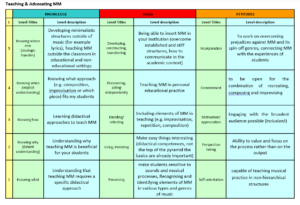Competence-oriented Learning

In a world where information is accessible to everyone it becomes more and more important in a professional context to not simply know things, but to display competences required for a task. Competence oriented learning is a form of learning adapted to the needs of today.
Through competence-orientated learning, music teachers can ensure that their teaching is of high quality, catering to the specific needs of their students and including innovative methods. Their students not only acquire theoretical knowledge, but also develop practical skills and creative forms of expression. This approach enables pupils to improve their musical skills in a targeted manner and to focus on their individual strengths. In addition, competence-orientated learning promotes self-reflection and independence. Both teachers and students benefit from that, as they can actively work on their own development and review their progress independently.
Overall, competence-oriented learning helps music educators to better prepare their students for the demands of the modern world and encourage them to realise their full creative potential.
- The Nutshell
- Relevance for music educators
- COL as Driver for Inclusion
-
Video
- Activities
- Resources
Competences as defined by various European bodies, as well as by educational experts throughout and beyond Europe, consist of three interrelated ingredients: · Knowledge (cognition), · Skills (capabilities and the overt behavioural repertoire) and · Attitudes (emotions and values). Competences consist of a combination of cognitive, behavioural and affective elements required for effective performance of a real-world task or activity. A competence is defined as the holistic synthesis of these components. If we see it this way it may be explained as the (inner) potential of a person to tackle a task. From another (an external) perspective a competence may again be divided in three aspects. A competent person is able to: · demonstrate behaviour · in a specific context and · at an adequate level of quality The development of competences is a very complex matter and is certainly not always a linear process. Competence development is a process which is highly dependent on the competence itself, the potentials (stages) of the learners and also on the external factors such as context and quality expectations. Competence-oriented learning and competence-oriented education do not consist of traditional teaching situations. They are based on the idea that the learners learn by experience and discovery. This concept has an impact on how learners may be educated. The idea is that learners need to be actively involved in the learning situation. They learn best in meaningful contexts and in co-operation and interaction with others and with their environment. Thus, they enable themselves to acquire knowledge, construe knowledge and check and cross check their newly constructed ideas with those of others. Key features of competence-oriented learning: · Meaningful contexts · Multidisciplinary approach · Constructive learning · Cooperative, interactive learning · Discovery learning · Reflective learning · Personal(ised) learning |
It is important for music educators to not only teach in a competence-oriented way, but follow this approach in their own learning, as this enables them to constantly develop their own skills and competences. They can work more effectively and successfully as educators and to better support and encourage their students. Through competence-orientated learning, music educators can become familiar with the latest pedagogical concepts and methods and thereby improve their teaching practice. Competence-oriented learning requires self-reflection, thus enabling the music educator to monitor their own progress and development. Furthermore, competence-orientated learning enables them to better pursue and achieve their own professional goals and career opportunities.
Overall, it helps music teachers to be professionally successful and to provide their students with a high-quality music education.
A competence-orientated learning approach can support inclusion by focusing on the individual abilities and strengths of learners. By emphasising competencies rather than deficits, all pupils can be supported in their learning process, regardless of their background, needs or individual circumstances.
Such an approach enables teachers to make lessons more inclusive by providing differentiated learning opportunities that meet the individual needs of each student. In addition, a competency-based learning approach promotes collaboration and social learning within learning groups, which in turn supports the integration of students with different abilities.
In addition, a competence-oriented learning approach can help to boost learners self-confidence and self-efficacy by enabling them to recognise and develop their own strengths. This enables them to learn in a self-determined and independent manner, which in turn improves their overall participation in lessons.
Activities
Instructions:
Prepare questions for an interview with an expert in your field. What knowledge, skills and attitude have they gained to become an expert? Then conduct the interview.
OR: Create a short podcast (5 min) where you are being interviewed as an expert of your field. What knowledge, skills, and attitudes have you acquired to become a professional?
OR: Write a sample job advertisement that covers the competences needed in and provided for your field of work.
Instructions:
Reflect your own Competence Level regarding the competences that are beneficial to teaching Minimal Music. Rate your knowledge, skills and attitude. Explain in each category why you estimated your competence on that level. Repeat after completing the other modules. Has there been a change?

We designed a Moodle course on Competence-Oriented Learning and Validation.
You can sign up here:
Course: T4S Competence Oriented Learning + Validation (COL+V) (mathetics.eu)
